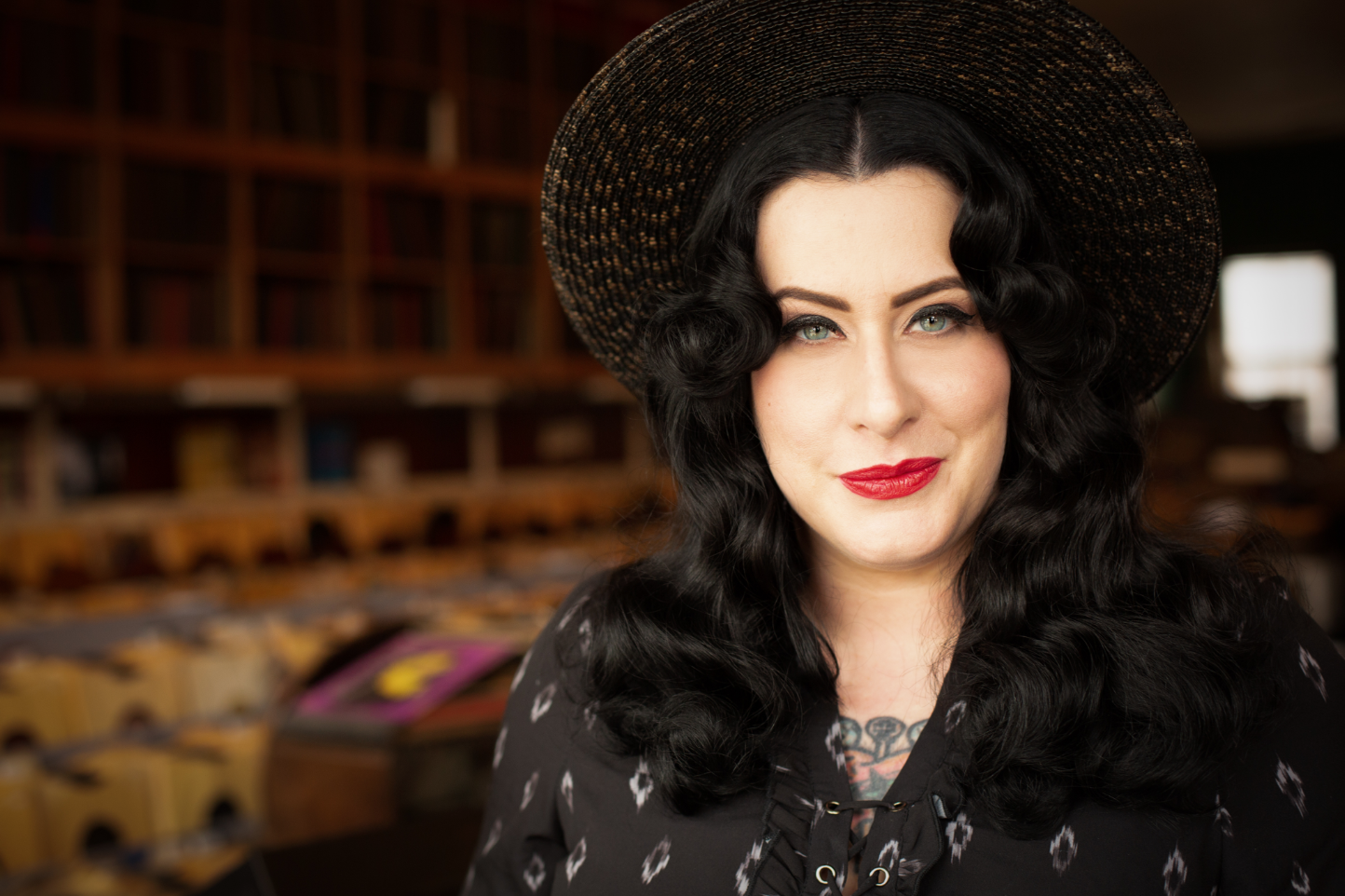Davina and the Vagabonds Combat Heartache with Sugar and Sass

Davina Sowers (photo by Christi Williams)
“Bone Collection,” the sultry vamp that kicks off Davina and the Vagabonds’ new album, Sugar Drops (out Aug. 2 on Red House Records), couldn’t be a more perfect introduction to the ongoing conversation between anxiety and insecurity and the despair-be-damned embrace of hope that fills the album.
Musically, the New Orleans jazz number strolls along, driven by a snaking clarinet with a chorus of trombones and cornet, setting a tone for the blues, jazz, and American songbook tunes that follow. Lyrically, Davina Sowers delivers her sweet and sarcastic punches in the song’s opening lines, which become the song’s refrain: “So you want a song about my deep confessions / The rivers that drown me and my bone collection / I’ll do what I can to make you fall in love with me.”
The song stemmed from frustration, Sowers says. “People were pressing and telling me I needed to come out with a new album. I was having writer’s block really bad; my emotions were there, but the words weren’t coming. So, I was sitting there trying to write a song,” she explains. “People wanted a song about the story of my life. I have many stories, and I started writing a song about my not being good enough. As I was sitting there I was kind of digging up bones, and wrote this song, asking, ‘Is this what you want?’ It was the first song of the new stuff.”

“I wanted it to be great,” she says. “I didn’t want my fans to hate it, or me, because there’s a guitar on the songs. I love to perform. The studio was scary and fearful.” At the same time, she reflects, making the album in a studio — she recorded her six previous albums in a basement with her traveling band — enabled her to approach these songs in a fresh and exciting way. “In the studio we recorded everything I wanted. The band had a vibe together. It’s the first time I’ve had a guitarist and a producer. With this album I wanted to have different players do something. I wanted music to be a little more produced. I wanted to hear the songs in the same way I hear them when I’m writing them. I wanted the ability to hear what I’m envisioning,” she says.
The new album also represents a transition emotionally for Sowers. “It’s an album I’ve written over a couple of years through a lot of changes in my life,” she says. “I was heartbroken and that’s when I started making the album. It was really healthy to make this album now for me to get a lot of shit off my chest. I was writing here and there, but I didn’t come out with an album; I wasn’t necessarily writing for an album.”
For Sowers, though, music has always been both refuge and redemption. It’s woven into the fabric of her being, so when she was writing these songs she was trying to find herself in them. Sowers refers to music as her “first and eternal love,” and it’s guided her through her lowest times. “I grew up in a shithole, a backward Pennsylvania town,” Sowers recalls. “When I was a kid, my mom was a folksinger. Her fifth husband, Clay, had a collection of 78s. I was listening to Melanie, Judy Collins, Joan Baez, Led Zeppelin, Black Sabbath, but also Fats Waller, Louis Armstrong, Duke Ellington. At six I was singing ‘I Am a Rock.’ I left at 15 and never went back. I’m an introverted extrovert. Music has always been my way of expressing myself.”
After she left home, she eventually descended into heroin addiction, and spent many days and nights on the streets and in jail, but eventually she kicked her habit, in large part thanks to music. In recovery from her addiction, Sowers hummed tunes or sang songs. “I would sing to myself when I was sick. When I was going through heroin withdrawal it was rough emotionally and physically. I would sing or sometimes I would scream out a song. It would make me feel better.
“I don’t know if the others around me felt the same way, though, about my singing,” she adds with a laugh.
Sowers’ deep and varied musical influences not only inhabit her soul, they also shape her songwriting. For her, songwriting is her way of understanding herself, whether she sits down at the piano to write or whether she jots down a lyric that comes to her. “There are different ways I do it,” Sowers says. “I sit down and cry at times. Sometimes words come up and I ask, ‘How the hell did that just happen?’ For me, songwriting is all emotional based. I’m trying to understand why I’m feeling like I am. I’m sussing out whatever’s going on in my brain and getting down to it. I try to hash it out all in one sitting. A lot of times I do have to go back to a song and revise or finish it. Songwriting is all or nothing emotionally. I have to figure myself out through songwriting.”
Each of the songs on Sugar Drops illustrates Sowers’ attempts to figure herself out through her words and the music on which the words float. The final song on the album, “Deep End,” a sparely sonic tune, Sowers’ vocals float over only a piano, the music mimicking the isolation and loneliness of the lyrics. As the bravado of “Bone Collection” opens the album, the quiet wonder-what’s-going-to-happen-now of “Deep End” closes it. “I was in the thick of a super down time. I hit bottom and all looked hopeless. I get so sad sometimes I can’t even sleep. It’s about losing my gratitude. It’s a driving-off-the-cliff song,” she says.
The title track opens quietly with piano trills and Sowers’ plaintive vocals. After the first verse, the song blossoms into a jazzy St. Louis blues, crossing somewhere between Fats Waller and Louis Armstrong. “I love the title,” she says. “It’s about love lost and love found. I felt very alone and very abandoned. It describes a transition from being alone. People don’t see my aloneness when I’m performing. I wrote the song as if I was abandoned on an ocean. Float a little back to me. It’s about getting through abandonment.”
“Devil Horns” is a raucous romp propelled by a Caribbean rhythm, mixed with a boogie-woogie jazz beat. The song’s bridge opens momentarily into June Carter and Merle Kilgore’s “Ring of Fire.” As Sowers says, this song is “sassy.” “To me, sassy is happy,” she explains. “My bad attitude makes me smile. A lot of my songs have a boogie-woogie beat.”
On Sugar Drops, Sowers didn’t have a narrative arc in mind. “I set it up so we’d have a certain vibe; the vibe in general was more important to me than having an arc or story to the album.” The rootsy vibe on the album ranges from jump blues and Pete Fountain-like jazz to brassy roadhouse rockers and waltzing ballads. “All roots music is packed into this band, everything from Fats Waller to Hank Williams,” Sowers says. “I have no idea how to describe what I do. I’m not hip enough to be jazz, not sad enough to be blues, so what to call what I do?”
In the end, it hardly matters how we describe what Sowers does on Sugar Drops. She cunningly matches music with lyrics so that lighter lyrics float along joyous strains of jazz while darker lyrics weave their ways through moody blues tunes. As Sowers reveals, “One half of the album is through darkness and depression, the other half is lighter. I really wanted to leave people with a full heart. To me, each one of these songs is just a little piece of me. Overall, I’m really happy about the album.”




